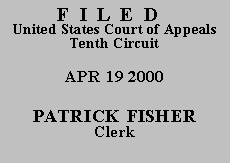
| MARK KENT NOLAN,
Petitioner-Appellant, v. DAYTON POPPEL, Respondent-Appellee. |
|
The petition for rehearing is granted in part. Our original order and judgment is amended to reflect that a certificate of appealability was granted and that petitioner's habeas claims were considered and denied on the merits under the applicable standard of review. A copy of the amended order and judgment is attached to this order and is substituted for the original. The petition for rehearing is otherwise denied.
Entered for the Court
Patrick Fisher, Clerk of Court
By: Keith Nelson
Deputy Clerk

| MARK KENT NOLAN,
Petitioner-Appellant, v. DAYTON POPPEL, Respondent-Appellee. |
|
Petitioner Mark Kent Nolan, a prisoner of the State of Oklahoma appearing pro se, appeals from the denial of his petition for habeas relief filed under 28 U.S.C. § 2254, and seeks leave to proceed on appeal in forma pauperis. His application for a certificate of appealability was previously granted and respondent has filed a response.
Petitioner is serving a thirty-five year sentence imposed after his conviction of first degree burglary and possession of a firearm after conviction of a felony. He argues(1) that: (1) the charging information was constructively amended, violating his right to due process; (2) his conviction for first degree burglary, in light of his acquittal on a charge of assault with a deadly weapon, violated his right to be free from double jeopardy; (3) evidence from the first phase of the bifurcated trial was improperly used in the second phase; (4) he was denied effective assistance of trial counsel; and (5) he was denied effective assistance of appellate counsel. The magistrate judge analyzed each of petitioner's claims and recommended that the petition be dismissed. The district court adopted the magistrate judge's recommendation.
Because petitioner filed his § 2254 petition in June 1998, the provisions of the Antiterrorism and Effective Death Penalty Act of 1996 (AEDPA) apply. See Lindh v. Murphy, 521 U.S. 320, 336 (1997). "[W]hen reviewing the merits of a claim already decided by the state courts, we are bound to deny habeas relief unless the state court's decision 'was contrary to, or involved an unreasonable application of, clearly established Federal law, as determined by the Supreme Court' or 'resulted in a decision that was based on an unreasonable determination of the facts in light of the evidence presented in the State court proceeding.'" LaFevers v. Gibson, 182 F.3d 705, 711 (10th Cir. 1999) (quoting 28 U.S.C. § 2254(d)(1), (2)). "If the habeas claim before us was not decided on the merits by the state courts, and the federal district court made its own determination in the first instance, we review the district court's conclusions of law de novo and its findings of fact, if any, for clear error." Id.
We have reviewed the magistrate judge's report and recommendation, the district court's order, the parties' materials, and the record on appeal. We find no error. Accordingly, petitioner's motion to proceed on appeal in forma pauperis is granted, and we AFFIRM the denial of habeas relief for substantially the same
reasons as those set forth in the magistrate judge's carefully prepared report and recommendation, as adopted by the district court.
Entered for the Court
Circuit Judge
*. This order and judgment is not binding precedent, except under the doctrines of law of the case, res judicata, and collateral estoppel. The court generally disfavors the citation of orders and judgments; nevertheless, an order and judgment may be cited under the terms and conditions of 10th Cir. R. 36.3.
1. Petitioner also argues that the discrepancy between the charging information and the proof at trial amounted to a prejudicial variance. Petitioner raised this argument for the first time in his objections to the magistrate judge's report and recommendation. See R. Doc. 19, at 1. Accordingly, we deem the issue waived and do not address it. See Marshall v. Chater, 75 F.3d 1421, 1426 (10th Cir. 1996).